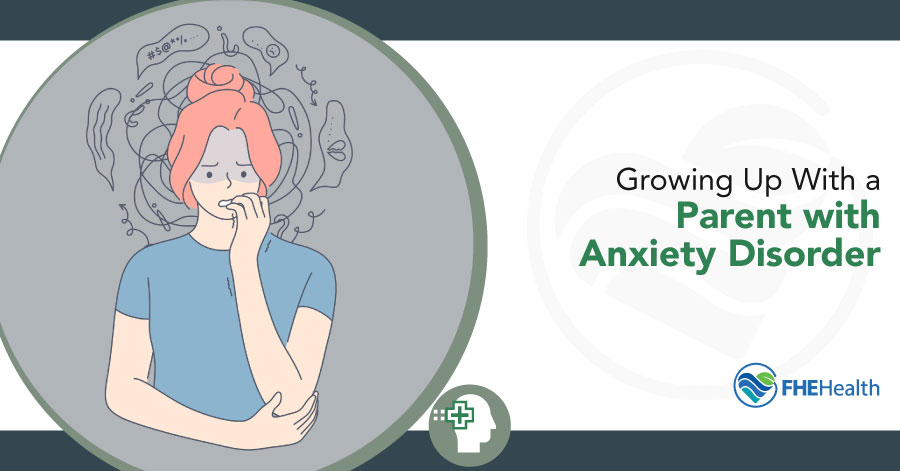
As a child, growing up with a parent with anxiety disorder can be a challenging experience. You may not understand why you got in trouble for doing something that seemed harmless.
You may have been on the receiving end of anger or a frustrated outburst that resulted from your parent’s anxiety. Perhaps your parent also struggled with depression and some days, they simply didn’t get up or care for you as they would normally.
While you may not have recognized what you were dealing with at the time, as you grow up, the effects of that early childhood trauma may manifest in other ways. Dealing with these childhood experiences may require you to seek help with your own mental health.
Childhood With a Depressed or Anxious Parent
Growing up with a parent who’s struggling with anxiety or depression can be a challenging and life-altering experience. As a child, having an anxious parent can affect you in many ways, depending on the type of anxiety your parent deals with.
A parent who suffers from generalized anxiety disorder (GAD) might catastrophize situations to an unrealistic level, inducing anxiety in you, the child, as a result of this reaction.
Kids who grow up with a parent who deals with social anxiety may have their social skills affected from a young age. A lack of socialization can have a major impact on a child growing up. This is especially true if the parent isn’t making active attempts to step outside their own comfort zone and engage in social activities for the benefit of their child.
Parents with post-traumatic stress disorder (PTSD) may experience bouts of rage, anger or intense nightmares that can be emotionally distressing for a child to witness.
Children dealing with a depressed parent may not understand why their mother or father seems detached, tired or sad all the time. They may feel neglected if the depression affects the parents to the degree that they’re struggling to take care of anyone but themselves.
What Does Anxiety Look Like?
An anxiety disorder can take many forms. Anxiety in a parent might display as:
- Being restless or tense
- Creating a sense of impending danger or doom
- Feeling exhausted frequently
- Having difficulty concentrating on anything besides their fears
- Hyperventilating
- Bursts of annoyance or frustration
- Periods of silence or distraction
Anxiety can be different for everyone, and symptoms vary depending on the type of anxiety disorder a person is dealing with.
Long-Term Effects of Having a Parent With Anxiety Disorder
So if the effects of having an anxious parent are difficult as a child, how do they affect the individual in the long term? Unfortunately, growing up with a parent with an anxiety disorder can have a lasting impact on your life.
A study conducted at King’s College London found that anxiety isn’t passed genetically between generations but manifests in kids based on the environment they’re raised in. When a parent reacts to certain situations with anxiety or indicates there’s a reason to be fearful of something unusual, it makes an impression on a child’s mind.
Even if the child grows up to be unafraid of the same things, they may still experience anxiety in another capacity. For example, the child of a parent with GAD might experience social anxiety.
Children of anxious mothers are also twice as likely to experience hyperactivity in adolescence. And according to the CDC, 7.1% of children in America between the ages of 3 and 17 have been diagnosed with anxiety.
How Parents Can Help Their Kids
If you’re a parent and aware that you’re dealing with anxiety, there’s no reason to panic about instilling permanent emotional trauma in your child. The fact that you’re cognizant of your anxiety and want to avoid passing those thought patterns on to your offspring is the first step. The most practical way for anxious parents to avoid passing fears and habits on to their kids is by attending therapy.
Counseling or therapy sessions can make you aware of your behaviors, thoughts, and reactions to situations. When you become aware of them, you can work on changing these patterns for the betterment of your own mental health. By doing so, you’ll ensure the way you handle a situation isn’t based on an anxious reaction that has negative repercussions for your kids.
Resolving Childhood Trauma
If you’re now coming to terms with how an anxious parent may have impacted your own mental health, there are a number of options available to you. Counseling, cognitive behavioral therapy (CBT), exposure therapy and medication are just a few of the treatment methods available for anxiety. By taking time to work through how this childhood trauma affected you, it’s possible to prevent it from becoming more of an issue in the future.
Besides professional treatment, there are some other healthy methods for coping with anxiety you can try. Meditation, yoga, breathing exercises and acupuncture can all help you get out of your head and tune into your body. This can help you learn to focus on the present moment rather than living in the future or past.
Seeking Help Is Always an Option
Whether you’re a parent with anxiety or you grew up with a parent who had anxiety, it’s time to break the cycle. As a parent, by taking part in talk therapy, you can identify your patterns and work on changing them. If you’re now dealing with anxiety as a result of your upbringing, there are plenty of ways we can help.
At FHE, our team of compassionate counselors is ready to support you in your mental health journey so you can manage your anxiety in a healthy way and enjoy your life to the fullest. Contact us today at (833) 596-3502 to learn about our anxiety and depression treatment solutions. We’re standing by to take your call 24/7.






